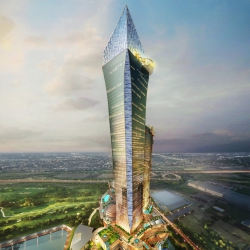The North Jersey casino referendum looks as if it is going down to ignominious defeat. The latest Fairleigh Dickenson University PublicMind poll shows that 70% of likely New Jersey voters are against the measure, which would authorize two casinos in the northernmost part of the state.
As late as June 2016, that number was at 58%. At a time when the vote was still 4 to 5 months away, it appeared that effective shaping of public opinion and get-out-the-vote efforts made the November 8 referendum a possible win. The pro-North Jersey casino movement’s support has collapsed from 35% to 24% in that time, when a similar shift was needed in the opposite direction.
No More Advertising
The news comes after proponents of the North Jersey casino initiative said they would drop advertisements for the referendum. With only a few weeks to move public opinion, it is seen as a waste of money to try to move the polls by 20% or more.
Both sides of the debate had engaged in substantial public relations and advertising campaigns until mid-October. Jersey City, Newark, and East Rutherford all had North Jersey casino rallies. Anti-North Jersey casino group “Trenton’s Bad Bet” and pro-North Jersey “Our Turn NJ” combined to spend $5.5 million on advertisements, according to Election Law Enforcement Commission. That is the most ever spent on a casino-related vote in New Jersey.
“Hard Time Selling the Idea”
Krista Jenkins, the director of PublicMind, said that it is no surprise to her that the initiative is a losing proposition. Prof. Jenkins said, “There has never been broad and deep support for allowing casinos to expand beyond Atlantic City. It’s no surprise, then, that backers of the amendment are having a hard time selling the idea to voters.”
The latest poll was conducted of 848 registered New Jersey voters on October 12 to October 16. The poll has a margin of error of 3.6%, so there is little chance the pollsters are wrong on the issue.
North Jersey Casino Movement
Proponents of North Jersey casinos believe that Atlantic City’s location is a detriment to the New Jersey casino industry. In a time when Atlantic City was the only gambling destination east of the Mississippi River, the Boardwalk was a great place for casinos. That was long ago, according to North Jersey advocates, before nearby states like New York, Pennsylvania, Connecticut, and Maryland built substantial casino or racino industries.
In an era where the casino market is fragmented and most gamblers stay closer to home, proponents of casinos outside of Atlantic City argue that two casinos near New York City would be a boon for the state. A billion dollars of those casinos’ tax revenue could be diverted to Atlantic City over the next 10 years, to help the city transition away from a failed gaming economy. Meanwhile, the casinos would draw customers not only from a city of 10 million-plus residents, but the massive influx of tourists and visitors to the New York City area.
Atlantic City Proponents
Those against the plan say North Jersey casinos would be the final nail in the coffin of Atlantic City’s casino industry. The city’s and area’s economy would collapse, so its tax base would collapse. The city would go bankrupt, requiring New Jersey to step in. Atlantic City would become more of a burden than it’s been.
Those same people argue that tradition, four decades of investment, and good common sense argue for protection of Atlantic City. Seven of the eight operating casinos are making a profit after the casino industry downsized in 2014, while the eighth casino’s closing (Trump Taj Mahal) in October should help the other gaming operations. Those sites can be profitable into the distant future, if New Jersey voters don’t undermine them.
New Jersey Voters’ Mindset
At a time when Atlantic City’s financial troubles are blamed on saturation of the casino market throughout the region, it is hard to convince voters to approve yet another expansion. To the electorate, it appears that New Jersey is shifting assets around the state — and in a way which is likely to harm Atlantic City more than it helps Newark, Jersey City, and East Rutherford.
Krista Jenkins believes the people of New Jersey believe they have plenty of gambling options.
She said, “When over a third of registered voters believe their casino fix is amply satisfied by what’s already here, and worry that more will do to other communities what casinos did to Atlantic City, the ‘more is better’ argument is a tough sell.”
North Jersey Casinos on the 2018 Ballot
It recently was reported that some North Jersey developers think a loss would not be a total disaster, because it would give then 2 years to plan a better movement in the time before a new referendum could happen.
If the casino vote is a major disaster for the proponents, it could derail those plans. Legislators and voters alike might not have patience for a new referendum, if the 2016 vote makes their efforts look wasted. If it’s a complete wipeout, then New Jersey lawmakers might not be interested in supporting a referendum in 2018.

